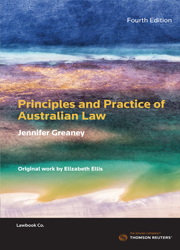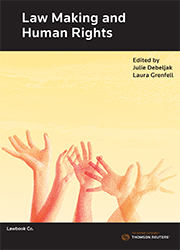
Books on Australian civil rights/human rights are generally located at KM 226.
 50 human rights cases that changed Australia
by
Lucy Geddes & Hamish McLachlan
The first book of its kind, 50 Human Rights Cases that Changed Australia summarises Australia's 50 most significant and influential human rights cases. The cases include landmark human rights cases from all Australian states and territories. They range from the seminal freedom of expression and First Nations land rights cases of the 1990s, to lesser-known earlier cases on civil liberties and criminal procedure and more recent advances in LGBTIQA+ rights, environmental rights, and the rights of people with disabilities. Each case summary explains, in plain language, the facts, the issues and the outcome of the case. Each summary also contains key quotes from the judgment, commentary situating the case in its social and political context, and critical analysis of the case's impact. The first half of the book contains summaries of cases that have advanced the rights of particular groups in the Australian community: First Nations rights; women's rights; LGBTIQA+ rights; disability rights; children's rights; asylum seeker and refugee rights; prisoners' rights. The second half of the book contains summaries of cases dealing with particular human rights: the right against racial discrimination; the right to liberty; criminal justice rights; the right to freedom of expression; democratic rights; the right to a healthy environment; and the rule of law. The cases demonstrate the potential of the law to achieve justice, as well as its limitations. They also reveal Australia's human rights protections to be piecemeal and inadequate -- illustrating the urgent need for a constitutional bill of rights. Written by two practising human rights lawyers, this anthology is an essential resource for law students, lawyers and activists. It also provides an engaging overview to anyone who might be curious about how the law, and in particular litigation, has advanced human rights in Australia.
50 human rights cases that changed Australia
by
Lucy Geddes & Hamish McLachlan
The first book of its kind, 50 Human Rights Cases that Changed Australia summarises Australia's 50 most significant and influential human rights cases. The cases include landmark human rights cases from all Australian states and territories. They range from the seminal freedom of expression and First Nations land rights cases of the 1990s, to lesser-known earlier cases on civil liberties and criminal procedure and more recent advances in LGBTIQA+ rights, environmental rights, and the rights of people with disabilities. Each case summary explains, in plain language, the facts, the issues and the outcome of the case. Each summary also contains key quotes from the judgment, commentary situating the case in its social and political context, and critical analysis of the case's impact. The first half of the book contains summaries of cases that have advanced the rights of particular groups in the Australian community: First Nations rights; women's rights; LGBTIQA+ rights; disability rights; children's rights; asylum seeker and refugee rights; prisoners' rights. The second half of the book contains summaries of cases dealing with particular human rights: the right against racial discrimination; the right to liberty; criminal justice rights; the right to freedom of expression; democratic rights; the right to a healthy environment; and the rule of law. The cases demonstrate the potential of the law to achieve justice, as well as its limitations. They also reveal Australia's human rights protections to be piecemeal and inadequate -- illustrating the urgent need for a constitutional bill of rights. Written by two practising human rights lawyers, this anthology is an essential resource for law students, lawyers and activists. It also provides an engaging overview to anyone who might be curious about how the law, and in particular litigation, has advanced human rights in Australia.
 Critical perspectives on human rights law in Australia
by
Paula Gerber & Melissa Castan (eds)
Critical Perspectives on Human Rights Law in Australia provides a comprehensive, accessible and scholarly examination of many of the key human rights issues facing Australia today. Written for human rights and legal scholars, legal practitioners and those readers who wish to increase their understanding of the field, this book provides a timely and intriguing discussion on the law and policy regarding the application of human rights standards in Australia today.
Critical perspectives on human rights law in Australia
by
Paula Gerber & Melissa Castan (eds)
Critical Perspectives on Human Rights Law in Australia provides a comprehensive, accessible and scholarly examination of many of the key human rights issues facing Australia today. Written for human rights and legal scholars, legal practitioners and those readers who wish to increase their understanding of the field, this book provides a timely and intriguing discussion on the law and policy regarding the application of human rights standards in Australia today.
 Principles and practice of Australian law
by
Jennifer Greaney
The fourth edition of Principles and Practice of Australian Law maintains the emphasis on context and skills as keys to understanding law in its practical operation. Within this framework, the new edition expands and updates existing material by reference to a range of important contemporary issues and cases.
Principles and practice of Australian law
by
Jennifer Greaney
The fourth edition of Principles and Practice of Australian Law maintains the emphasis on context and skills as keys to understanding law in its practical operation. Within this framework, the new edition expands and updates existing material by reference to a range of important contemporary issues and cases.
 Law making and human rights : executive and parliamentary scrutiny across Australian jurisdictions
by
Julie Debeljak & Laura Grenfell
Law Making and Human Rights examines how rights figure in the law-making process. The topics covered in this new title are presented by experts and scholars to offer a comprehensive analysis of how rights are scrutinised in all Australian jurisdictions.
Law making and human rights : executive and parliamentary scrutiny across Australian jurisdictions
by
Julie Debeljak & Laura Grenfell
Law Making and Human Rights examines how rights figure in the law-making process. The topics covered in this new title are presented by experts and scholars to offer a comprehensive analysis of how rights are scrutinised in all Australian jurisdictions.